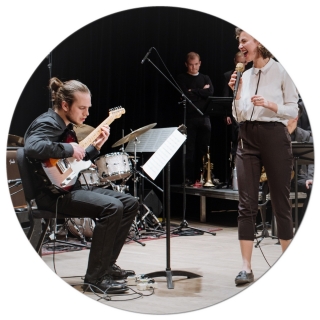 Examine fundamental questions about humanity, identity, and expression
Examine fundamental questions about humanity, identity, and expression
McGill researchers deepen understanding of what it means to be a person living in the 21st century. They explore bold and challenging questions—such as, “Who are we?”, “Where have we come from?”, “What is good, right, or fair?” and “How do we express ourselves?”—that form the basis of critical and ethical thinking and self-awareness in an interconnected world.
Close attention to histories and cultural differences reflects the need to understand the complex relationships between the temporality of the past and the spatiality of the present. At the same time, it is crucial to understand diverse societies – to understand and speak their languages, to know their histories through historiography and other approaches—in order to learn from them as well as to learn about them. Humanistic inquiry is the search for, and the creation and interpretation of, meaning.
We, as humans, aspire to understand the human condition through careful observation and introspection, through the interpretation of cultural and religious narratives, by revealing societies through their legal traditions, their creative arts and performance, and through the analysis of literature, music, and visual arts.
Image Credit: Tam Lan Truong
Youth and girlhood studies
Youth and girlhood studies have advanced in the last decade in ways that acknowledge the role of young people in identifying and acting on issues, such as gender-based violence, safety and security, homelessness, and gender and sexual identity in their everyday lives. Participatory visual and other arts-based methodologies through, for example, the use of cellphones and other devices to produce cellphilms, vlogs, and other media forms are helping to reshape work with and about youth, so that there is an increased recognition of the ways in which young people are co-producers of knowledge. McGill’s work in the area of youth and gender is helping to transform the ways in which schools, communities and international NGOs are conceptualizing this work, particularly in the context of youth-led, “from the ground up” community and policy dialogue.
Jazz composition performance
In contemporary jazz composition and performance, there has been a decline in sustained improvisation-composition, in favour of other approaches. Researchers and performers at McGill reinvent the concept of a laboratory of rotating musicians, created by influential bass player Charles Mingus in the mid-20th century. The group of researchers and performers recreates a participatory, self-reflective melting pot in order to explore and better understand the tradition of collective improvisation in jazz music performance.
Linguistics
Language is a key part of what sets humans apart from all other species, and is central to both human cognition and cultural identity. Linguistics investigates the unique human capacity for language by working to understand the abstract system of grammar, from sounds to sentence structure to meaning, as well as the range and limits of variation found across human languages. Ongoing research partnered with Indigenous communities finds ways in which language researchers and community-based language teachers can work together to advance our theoretical understanding of a diverse set of languages, while also contributing to documentation and revitalization of threatened minority languages.
Montreal
Montreal, like other large cities, is comprised of many different communities, with a variety of cultural narratives. These narratives provide entree into the collective psyche and can help us to understand a community’s strengths, challenges and priorities, as well as its values and aspirations. They also point toward new actions, which can be strategically leveraged to achieve collective aspirations. Researchers at McGill are developing methods and tools to capture these narratives, cross-reference them with quantitative social data and subject them to in-depth analyses, with a view to understanding the key issues and the conditions for social transformation. These research activities are based on the hypothesis that innovations will only lead to meaningful and sustainable social transformations when they are linked to local culture and when they, in turn, create positive transformative narratives.